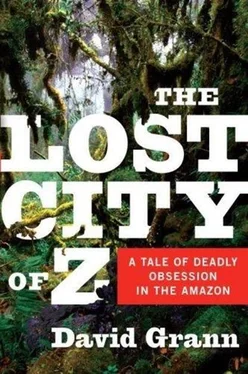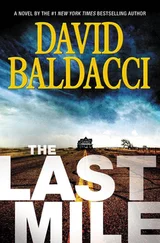David Grann
THE LOST CITY OF Z
A Tale of Deadly Obsession in the Amazon
At times all I need is a brief glimpse, an opening in the midst of an incongruous landscape, a glint of lights in the fog, the dialogue of two passersby meeting in the crowd, and I think that, setting out from there, I will put together, piece by piece, the perfect city… If I tell you that the city toward which my journey tends is discontinuous in space and time, now scattered, now more condensed,
you must not believe the search for it can stop.
Italo Calvino,
Invisible Cities
Copyright © 2005, 2009 by David Grann

I pulled the map from my back pocket. It was wet and crumpled, the lines I had traced to highlight my route now faded. I stared at my markings, hoping that they might lead me out of the Amazon, rather than deeper into it.
The letter Z was still visible in the center of the map. Yet it seemed less like a signpost than like a taunt, another testament to my folly.
I had always considered myself a disinterested reporter who did not get involved personally in his stories. While others often seemed to succumb to their mad dreams and obsessions, I tried to be the invisible witness. And I had convinced myself that that was why I had traveled more than ten thousand miles, from New York to London to the Xingu River, one of the longest tributaries of the Amazon, why I had spent months poring over hundreds of pages of Victorian diaries and letters, and why I had left behind my wife and one-year-old son and taken out an extra insurance policy on my life.
I told myself that I had come simply to record how generations of scientists and adventurers became fatally obsessed with solving what has often been described as “the greatest exploration mystery of the twentieth century”-the whereabouts of the lost City of Z. The ancient city, with its network of roads and bridges and temples, was believed to be hidden in the Amazon, the largest jungle in the world. In an age of airplanes and satellites, the area remains one of the last blank spaces on the map. For hundreds of years, it has haunted geographers, archaeologists, empire builders, treasure hunters, and philosophers. When Europeans first arrived in South America, around the turn of the sixteenth century, they were convinced that the jungle contained the glittering kingdom of El Dorado. Thousands died looking for it. In more recent times, many scientists have concluded that no complex civilization could have emerged in so hostile an environment, where the soil is agriculturally poor, mosquitoes carry lethal diseases, and predators lurk in the forest canopy.
The region has generally been regarded as a primeval wilderness, a place in which there are, as Thomas Hobbes described the state of nature, “no Arts; no Letters; no Society; and which is worst of all, continuall feare, and danger of violent death.” The Amazon’s merciless conditions have fueled one of the most enduring theories of human development: environmental determinism. According to this theory, even if some early humans eked out an existence in the harshest conditions on the planet, they rarely advanced beyond a few primitive tribes. Society, in other words, is a captive of geography. And so if Z was found in such a seemingly uninhabitable environment it would be more than a repository of golden treasure, more than an intellectual curiosity; it would, as one newspaper declared in 1925, “write a new chapter of human history.”
For nearly a century, explorers have sacrificed everything, even their lives, to find the City of Z. The search for the civilization, and for the countless men who vanished while looking for it, has eclipsed the Victorian quest novels of Arthur Conan Doyle and H. Rider Haggard-both of whom, as it happens, were drawn into the real-life hunt for Z. At times, I had to remind myself that everything in this story is true: a movie star really was abducted by Indians; there were cannibals, ruins, secret maps, and spies; explorers died from starvation, disease, attacks by wild animals, and poisonous arrows; and at stake amid the adventure and death was the very understanding of the Americas before Christopher Columbus came ashore in the New World.
Now, as I examined my creased map, none of that mattered. I looked up at the tangle of trees and creepers around me, and at the biting flies and mosquitoes that left streaks of blood on my skin. I had lost my guide. I was out of food and water. Putting the map back in my pocket, I pressed forward, trying to find my way out, as branches snapped in my face. Then I saw something moving in the trees. “Who’s there?” I called. There was no reply. A figure flitted among the branches, and then another. They were coming closer, and for the first time I asked myself, What the hell am I doing here?
On a cold January day in 1925, a tall, distinguished gentleman hurried across the docks in Hoboken, New Jersey, toward the SS Vauban, a five-hundred-and-eleven-foot ocean liner bound for Rio de Janeiro. He was fifty-seven years old and stood over six feet, his long arms corded with muscles. Although his hair was thinning and his mustache was flecked with white, he was so fit that he could walk for days with little, if any, rest or nourishment. His nose was crooked like a boxer’s, and there was something ferocious about his appearance, especially his eyes. They were set close together and peered out from under thick tufts of hair. No one, not even his family, seemed to agree on their color- some thought they were blue, others gray. Yet virtually everyone who encountered him was struck by their intensity: some called them “the eyes of a visionary.” He had frequently been photographed in riding boots and wearing a Stetson, with a rifle slung over his shoulder, but even in a suit and a tie, and without his customary wild beard, he could be recognized by the crowds on the pier. He was Colonel Percy Harrison Fawcett, and his name was known throughout the world.
He was the last of the great Victorian explorers who ventured into uncharted realms with little more than a machete, a compass, and an almost divine sense of purpose. For nearly two decades, stories of his adventures had captivated the public’s imagination: how he had survived in the South American wilderness without contact with the outside world; how he was ambushed by hostile tribesmen, many of whom had never before seen a white man; how he battled piranhas, electric eels, jaguars, crocodiles, vampire bats, and anacondas, including one that almost crushed him; and how he emerged with maps of regions from which no previous expedition had returned. He was renowned as the “David Livingstone of the Amazon,” and was believed to have such unrivaled powers of endurance that a few colleagues even claimed he was immune to death. An American explorer described him as “a man of indomitable will, infinite resource, fearless;” another said that he could “outwalk and outhike and outexplore anybody else.” The London Geographical Journal, the preeminent publication in its field, observed in 1953 that “Fawcett marked the end of an age. One might almost call him the last of the individualist explorers. The day of the aeroplane, the radio, the organized and heavily financed modern expedition had not arrived. With him, it was the heroic story of a man against the forest.”
In 1916, the Royal Geographical Society had awarded him, with the blessing of King George V, a gold medal “for his contributions to the mapping of South America.” And every few years, when he emerged from the jungle, spidery thin and bedraggled, dozens of scientists and luminaries would pack into the Society’s hall to hear him speak. Among them was Sir Arthur Conan Doyle, who was said to have drawn on Fawcett’s experiences for his 1912 book The Lost World, in which explorers “disappear into the unknown” of South America and find, on a remote plateau, a land where dinosaurs have escaped extinction.
Читать дальше













